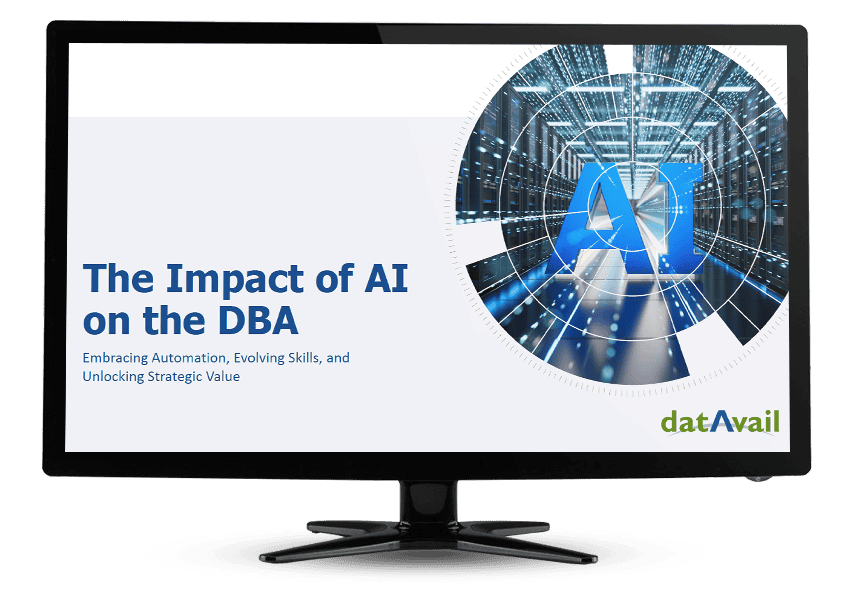The Impact of AI on the Database Administrator

Database administrators are at a crossroads. While AI promises to automate routine tasks and enhance performance tuning, it’s also fundamentally changing what it means to be a DBA. In this exclusive DBTA roundtable webinar, Datavail’s JP Chen, Senior Director of SQL Server Services, and Matt Shelvock, Product Advocate, Datavail TechBoost™, reveal how forward-thinking DBAs are transforming their roles from reactive maintenance to strategic data leadership. Discover the skills, tools, and mindset shifts that separate AI-ready database professionals from those left behind by technological change.
Key Insight Preview
“The rise of AI isn’t eliminating the DBA role—it’s elevating it. DBAs who embrace AI tools while developing strategic thinking skills will become indispensable partners in their organization’s data-driven success.”
What You’ll Learn
How AI Automation Is Reshaping Database Management Responsibilities
Understand which routine tasks AI handles best and which strategic functions remain firmly in human control, allowing you to focus your expertise where it matters most.
Essential Skills for the Modern DBA in an AI-Driven World
Learn the specific competencies you need to develop in cloud technologies, AI tool integration, and cross-functional collaboration to stay relevant and valuable.
Critical AI Limitations Every DBA Must Understand
Discover how to identify and mitigate AI biases, inaccuracies, and blind spots that could compromise database integrity and business operations.
New Technologies and Tools Transforming Database Operations
Explore the latest AI-powered platforms, monitoring solutions, and automation frameworks that successful DBAs are already implementing.
Real-World Success Stories of AI Implementation
See how organizations are achieving measurable improvements in performance, cost reduction, and operational efficiency through strategic AI adoption in database management.
The Strategic Evolution from Reactive to Proactive Database Leadership
Learn how to position yourself as a strategic partner who drives business value rather than just maintaining systems.
Frequently Asked Questions
Which database tasks can AI effectively automate, and which require human expertise?
AI excels at routine maintenance tasks like index optimization, basic performance monitoring, and predictable troubleshooting scenarios. However, complex database architecture decisions, security policy implementation, and strategic capacity planning still require human judgment and business context. The most successful DBAs learn to delegate routine work to AI while focusing their expertise on high-value strategic initiatives that directly impact business outcomes.
What new skills should DBAs prioritize to work effectively with AI tools?
Modern DBAs need to develop proficiency in cloud platforms, understand AI tool capabilities and limitations, and build cross-functional communication skills. This includes learning to interpret AI recommendations, validate automated solutions, and translate technical insights into business value. Equally important is developing a strategic mindset that focuses on proactive problem-solving rather than reactive maintenance.
How can DBAs identify and address AI biases in database management?
AI biases in database management often manifest as skewed performance recommendations based on incomplete data patterns or overlooked edge cases in automated tuning. DBAs should establish validation processes for AI-generated recommendations, maintain diverse data sources for training AI tools, and regularly audit automated decisions against business requirements. Understanding your organization’s unique data patterns and business context remains critical for catching what AI might miss.
What are the biggest opportunities for DBAs in an AI-enhanced environment?
AI automation frees DBAs from repetitive tasks, creating opportunities to become strategic partners in data architecture, business intelligence, and digital transformation initiatives. Forward-thinking DBAs are positioning themselves as consultants who help organizations make smarter decisions about data infrastructure, compliance, and risk management. The key is shifting from asking “How do I maintain this system?” to “How can our data infrastructure drive better business outcomes?”
Watch the Webinar Here